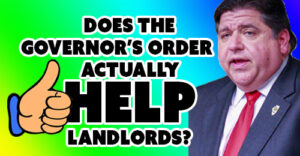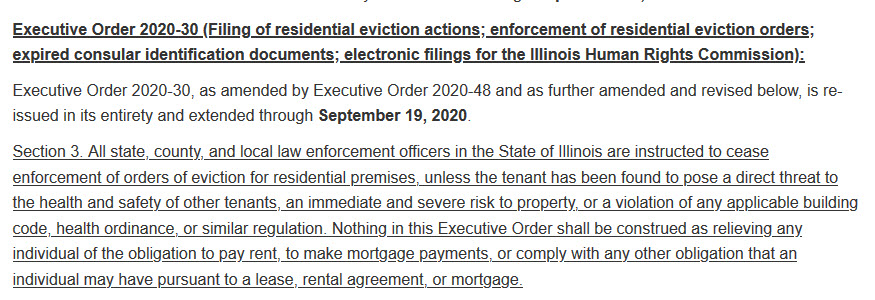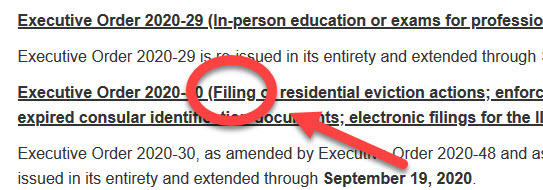 Governor Drops a Big Hint
Governor Drops a Big Hint
As discussed here last week, over the weekend, by way of Executive Order 2020-52, Governor Pritzker has extend the moratorium on commencement and execution of certain evictions until September 19, 2020. I will not bother to opine on how this policy decision will negatively impact landlords nor the hopeless unfairness of this policy to small and large housing providers. I will say that there might be one small glimmer of hope contained in the language of the executive order. First, the language extending the order: So, there you have it, but let’s be reminded about the most relevant part of that order, the prohibition on residential evictions.
So, there you have it, but let’s be reminded about the most relevant part of that order, the prohibition on residential evictions.
Section 2 of Executive Order 2020-30 indicates the new rules we will be following for RESIDENTIAL eviction situations:
Section 2. A person or entity may not commence a residential eviction action pursuant to or arising under 735 ILCS 5/9-101 et seq., unless a tenant poses a direct threat to the health and safety of other tenants, an immediate and severe risk to property, or a violation of any applicable building code, health ordinance, or similar regulation. Nothing in this Executive Order shall be construed as relieving any individual of the obligation to pay rent or comply with any other obligation that an individual may have pursuant to a lease or rental agreement. This Executive Order does not supersede any provision of any other prior Executive Order. (emphasis added)
Okay, so the crux of the situation here is that a landlord may not COMMENCE a residential eviction action under the eviction act. So, what constitutes commencement? Most people would probably argue that commencing an “action” begins with the filing of papers in eviction court. Most people would probably not agree that the service of a 5, 10 or 30 day notice is commencing an action. After all – a 5 day notice says “hey, here’s a reminder that you didn’t pay me. And, if you don’t pay me in five days, I will be forced to file an eviction action“.
Tenants’ rights advocates, being dedicated to their job of keeping tenants in housing as long as they can have suggested the position that the service of a 5 day notice is, in fact, the commencement of an eviction action. This argument was made most famously and most publicly by attorney Mark Swartz, the Executive Director of the prominent tenants’ rights organization The Lawyer’s Committee for Better Housing when Mr. Swartz spoke at Mayor Lightfoot’s press conference announcing the Chicago Housing Solidarity Pledge back in April, 2020. At that event, Mr. Swartz had this to say:
(You probably clicked on the video above and got a notice that the Mayor won’t let us share it here. So, please click here and scroll over to 21:30 on that video although my link should get you close).
I have heard rumors and rumblings that tenants’ rights attorneys will make this argument when eviction cases finally resume. I have also heard that there might be a few judges sympathetic to the argument.
But, let’s take a look at the PLAIN LANGUAGE of the Governor in his Executive Order 2020-52. There it is, right there, for all to see in the caption to the section related to extending the moratorium under Executive Order 2020-30.

Right there on the page, Executive Order 2020-30 is characterized as an order about FILING residential eviction actions. It is not an order about serving notices. If there was ever a “plain language” argument to be made, that would be it right there.
What will happen when the courts are finally open for eviction cases? Who knows. Despite this clear authority cited above, I’m sure the tenants’ rights side of the aisle will want “their day in court” on this issue. That will likely cause briefing schedules, oral arguments, and maybe even appeals. As I always say, tenants don’t win their eviction case by winning. They win their eviction case by making arguments that keep them in the landlord’s unit even longer and for no rent. Heck, the judges on the 14th floor might even agree with the tenant-side and will invalidate all eviction notices served before September 19, 2020.
So, what can you do about that as a landlord? Contact the Governor. Contact your state representative. Ask him to clarify Executive Order 2020-30. Ask your representatives to Ask Governor Pritzker to clarify Executive4 Order 2020-30. You have the time. In most cases, there are no evictions allowed until September 19, 2020. Let’s save everyone the pain, anguish, and uncertainty of having this issue find its way in front of a judge. Landlords can’t do much right now, but they can demand some clarity so that they know what they can and can not do once the moratorium is lifted.
